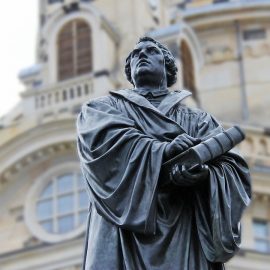
Do we have free will? What are the various views and arguments entailed in the debate?
Philosophers continue to wrestle with the issue of free will, discussing what it is and whether or not human beings have it. Sam Harris explains that three points of view have emerged: determinism, libertarianism, and compatibilism.
Read more to learn about these three schools of thought regarding free will in philosophy and to get Harris’s take on them.
Free Will in Philosophy
When Harris argues that we don’t have free will, his argument draws on a very specific definition of free will. Harris characterizes free will as a state in which we’re conscious of, and have control over, the processes that give rise to our thoughts and decisions. He contends that, if we don’t have the ability to observe and influence the processes behind our thoughts, then we can’t really have ultimate responsibility over what we think and do.
(Shortform note: Though it’s true that there are many ways to think about free will in philosophy, philosopher Eddy Nahmias argues that there’s also a longstanding consensus among philosophers about how it’s reasonable to define free will—a consensus that Nahmias says is often ignored by those who say free will is an illusion. This consensus is that we have free will to the extent that we have and exercise a capacity for conscious deliberation, rational thinking, and self-control. Nahmias notes that these components of free will aren’t mysterious but instead are all functions that both psychologists and neuroscientists can study scientifically.)
Harris explains three schools of thought regarding free will in philosophy: determinism, libertarianism, and compatibilism. We’ll explore each of them and how they answer the question of whether or not we have free will—as well as Harris’s take on each of them.
View #1: Determinism: External Factors, Not Free Will, Drive Our Behavior
Determinists believe that we don’t have free will and that our thoughts, desires, intentions, and choices are determined by events outside our control. Harris explains that for determinists, every event in the universe—including each of our thoughts, decisions, and actions—is caused by a long chain of events. We could theoretically trace this chain back to the beginning of our lives (or even back to the beginning of the universe) to find an explanation for any decision we make. Determinists argue that if a decision is caused in this way by events that came before it, then it’s not made freely.
Harris’s take: Harris adopts a determinist point of view. He writes that an array of external factors—events and influences that are outside of our control (like what our parents taught us when we were children) or even outside of our consciousness (like the subtle messages we’ve received from books, TV, and movies)—have conditioned our brains in precisely the right ways for it to make the decisions that we feel we’ve made freely. Because he contends that our thoughts and intentions are fully caused by these past events and by the systematic way that our brains respond to them, through processes that we can’t consciously access, Harris concludes that we don’t have free will.
View #2: Libertarianism: External Factors Affect, but Don’t Determine, Our Actions
Libertarians—referring to the philosophical view, not the political philosophy of the same name—believe that events are not predetermined and that we do have free will. Harris explains that libertarians reject the idea of determinism: They don’t believe that all of the events in the universe, including our choices and actions, are caused by past events. Libertarians also don’t believe that our thoughts and decisions are fully explainable in physical terms: by the systematic ways our brains respond to past events and to influences outside of our consciousness and control. Instead, libertarians contend that while these influences affect our thoughts and behavior, we’re ultimately free to make our own decisions.
Harris’s take: As a determinist, Harris agrees with libertarians on incompatibilism: the idea that free will and determinism are inherently contradictory. But he disagrees with them on indeterminism: the idea that not everything is predetermined. Harris also rejects the libertarian idea that human behavior isn’t fully explained by the physical cause and effect that occurs when our brains respond to influences outside of our consciousness or to stimuli outside our bodies. He also objects to the way that some libertarians account for this complexity by arguing that we aren’t just physical entities and may even have something like a mind or a soul in addition to our physical matter. Harris rejects this possibility.
View #3: Compatibilism: External Factors Cause Our Behavior, but So Does Free Will
Compatibilists believe that we have free will and they also believe in determinism. That means they accept free will and determinism as compatible truths (unlike both determinists and libertarians, who believe that these two are incompatible). According to Harris, compatibilists contend that past events determine our decisions and that those decisions are still our own. This means that compatibilists define free will differently than Harris does: as an ability to act in ways that are consistent with your preferences and reasoning, without outside forces stopping you. In other words, compatibilists believe that while your actions are caused by prior events, they’re also free as long as they accord with what you consciously decide and desire.
Harris’s take: Harris rejects the idea that choices can be both caused and free because he says that this point of view can’t be reconciled with what scientists have discovered about the brain. In particular, he writes that compatibilism doesn’t make sense if our thoughts and choices are caused by unconscious processes, which in turn are influenced by myriad external factors. He argues that simply becoming aware of a choice after it’s been determined by the brain, and then acting on it, isn’t the same thing as freely and consciously choosing it.
| Complicating Harris’s Views on Determinism, Libertarianism, and Compatibilism Harris presents a succinct overview of the determinist, libertarian, and compatibilist ideas of free will, but many experts view these theories in ways that differ substantially from Harris’s interpretations. Determinism: Philosopher Mark Balaguer writes in his book (which is also titled Free Will) that the philosophy of determinism rests on the assumption that the science of determinism is true—but that’s still up for debate. Classical physics posits that determinism is true. Yet as Stephen Hawking explains in A Brief History of Time, modern quantum mechanics is probabilistic, not deterministic: It explains what will probably happen next, not what will happen next. This means that at least some things aren’t caused by prior events but just happen. Balaguer characterizes a determinist argument (like Harris’s) as fatally flawed because determinism is still unproven and thus can’t provide proof that free will doesn’t exist. Libertarianism: Philosopher John Lemos argues that Harris’s critique oversimplifies libertarian arguments. He says that instances in which we deliberate between two conflicting options, like stepping in to prevent a mugging or continuing on to work, are examples of cases in which we have free will and can therefore be held morally accountable for our actions. Lemos adds that Harris seems to be implying that all scientific evidence currently points toward determinism when that’s actually not the case: In fact, he says, some scientific studies throw these conclusions into doubt and show that the brain doesn’t necessarily work according to linear cause and effect. Compatibilism: According to philosopher Daniel Dennett, compatibilism is a point of view that’s separate from determinism and indeterminism, so Harris makes a mistake in rejecting compatibilism just because he believes that determinism is true. Dennett also criticizes Harris’s portrayal of the compatibilist idea of free will as doing what we want to do, as well as Harris’s rejection of the idea on the grounds that this isn’t absolute freedom (a theoretical form of free will where we could choose our desires). Dennett writes that in arguing that this is a failing with compatibilism, Harris has created a straw man version of compatibilism so he can dismiss it. |
How Do We Think About Free Will in Our Everyday Lives?
While it’s useful to understand how philosophers talk about free will, there’s another important explanation of free will that Harris examines (and ultimately rejects): free will as we think of it in our everyday lives. According to Harris, the popular idea of free will is that we’re the true source of what we think and feel. In other words, we make our choices freely, and our thoughts, intentions, and desires originate with us.
This idea enables us to feel agency and responsibility for our behavior. According to Harris, most people are familiar with this idea of free will, and it shapes our sense of self and agency. But Harris points out that this idea of free will is substantially more expansive than the most popular argument in favor of free will among philosophers: the compatibilist idea of free will as the ability to act on the thoughts and intentions that occur to us—after they’re caused by outside events and influences—without anything stopping us. Harris writes that the popular idea of free will falls apart if we accept that our thoughts are shaped by causes we can’t control.
(Shortform note: Some experts believe that how people actually think about free will is much simpler than the definition that Harris believes people are working with. One psychologist writes that most people define free will as the ability to make choices that fulfill their desires, without constraints—a definition that sounds a lot more similar to the compatibilist definition of free will than Harris contends. In fact, philosopher Shaun Nichols explains that most people’s intuitions about themselves and their decisions align with compatibilism. That might be why, even if we believe we’re living in a deterministic world, we still feel that we’re making our own decisions.)
| Do Ordinary People Need to Worry About Free Will? Harris devotes considerable attention to the ideas that ordinary people hold about whether we freely determine our thoughts, decisions, and actions. But one reviewer of Harris’s book notes that it’s a modern phenomenon that ordinary people would have any ideas on the topic at all. For centuries, the question of whether we have free will was only relevant to experts in philosophy and religion, and public interest in the topic has been fueled by scientific progress. Even as the average person becomes more aware that philosophers and scientists have proposed various theories about free will, cognitive scientist Jim Davies writes that maybe it doesn’t matter to the average person whether we have free will. A review of 150 studies with a total of almost 26,000 participants found that belief or disbelief in free will doesn’t seem to affect individuals’ antisocial behavior, morality, or conformity. This suggests that whether or not we believe in free will doesn’t have practical consequences. |






